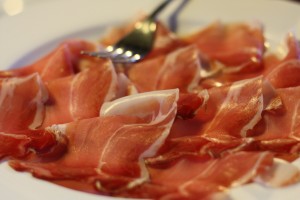It was very strange.
In the past, whenever I’ve visited Italy, I’ve been able to get by, language-wise. For one thing, Italians tend to be an enormously gracious and generous people, and even if they’re in a cranky mood, they still manage to be helpful and kind-natured. Which, in turn, makes the non-Italian speaking American traveler feel very haughty and worldly indeed.
But on my recent trip to Parma, I discovered that my attempts to make myself understood were, by and large, falling flat. On the one hand, when asked what my gastro-cultural inclinations were, I would launch myself head first into a Slow Foodie ramble that would leave them scratching their heads.
You’d think I was speaking another language or something.
Noting their confusion, I would add words like Carlo Petrini. Still, nothing.
One of my travel mates added Gambero Rosso, which resulted in utter silence on the part of our hosts.
And that’s when I realized: I was a journalist, visiting Italy to see a man about a pig–or at least what is arguably the finest pig product created in Emilia-Romagna. Prosciutto di Parma has been produced more or less in exactly the same way, year after year, since around 100 B.C., and the fact of it in this particular region is like air, or water: it’s there, and it is utterly, staggeringly, mind-bogglingly delicious when virtually nothing is done to it beyond slicing it whisper-thin.
Journalista Gastronomica, I would say, and then once in a while I would add politica, and they would smile politely and walk away. At first, I was sort of surprised, but then I realized that the subject of food and politics is a very complicated one; in Italy–in most of Europe–artisanal products are labeled PDO (Protected Designation of Origin), meaning that, in the case of this particular pig product, Parma ham can only come from Parma, and the end product must pass a rigorous series of tests pointing to its traceability and quality. If it doesn’t pass muster, it doesn’t pass muster. Italians don’t seem big into shoe-horning something into a specific category if they feel–honestly–that it doesn’t belong there, just for a few extra Euros. Because if you’ve got more than a thousand years backing you up, why would you skimp on the details? You just wouldn’t.
Which of course is not to say that the so-called Prosciutto di Parma that I bought from my local market the other day was, in fact, Prosciutto di Parma. I looked for the tell-tale metal tag on its shank when the deli guy took it out of the refrigerated case, and it wasn’t there. When I asked about this tag—which all real Prosciutto di Parma hams must have, by law, and which indicates exactly when the curing process began—he said “oh, well, that’s because it’s domestic Prosciutto di Parma.”
“But it’s not Prosciutto di Parma,” I said, “so please don’t call it that.”
“But that’s what the label says, lady, ” the guy responded.
“Look, call it Prosciutto di Hoboken, or Prosciutto di Fargo, or wherever it’s made. But if it doesn’t come from Parma, don’t call it Prosciutto di Parma.”
I was clearly picking a fight, and this guy just didn’t know what to do with me.
My hosts in Italy were nothing if not extremely polite, and I suspect that if I’d wanted to have a throw-down discussion about the intricacies of PDO certifications and labeling issues, they might have obliged. But in truth, I think they dodged the questions more because the practice of mislabeling tends to be a far bigger problem on our side of the ocean than on theirs (Brunello debacle not withstanding, of course). And for the average Parmesan, it’s really all just about the pig, qualitatively; and anyone who calls Parma ham Parma ham when it’s not Parma ham won’t survive. Simple as that.
My last night in Parma, I asked our host how he preferred to eat his Prosciutto di Parma. He looked at me, confused, and I assumed that it was another case of our language barrier at work.
“Like this,” he said, picking a slice up with his fingers, and depositing it in his mouth.
Then he smiled a broad smile, and said “No need to make things more complicated.”





Beautifully written. No need to make things more complicated.
Ciao
What a delighful story. Either you were being intentionally mislead, or perhaps there really is no difference with the tags. I have such a perverse range of quality both in Italy and here, that I wonder what the standards are or whether I was being sold something else! Or whether the shop just let the ham dry too much, which I suspect. Sometime San Daniele is sweeter and softer. Oops. Silent.